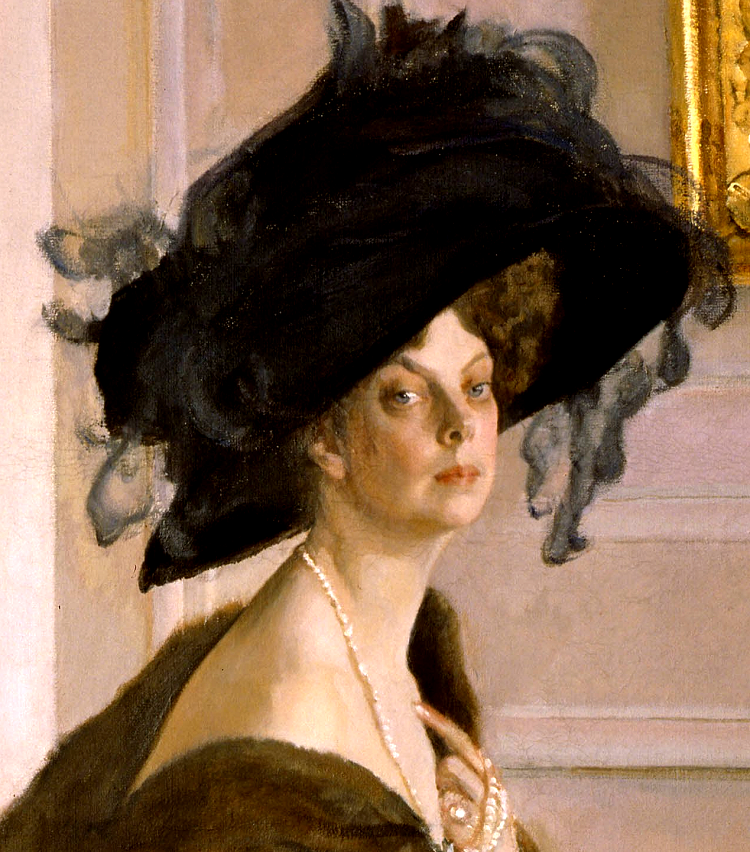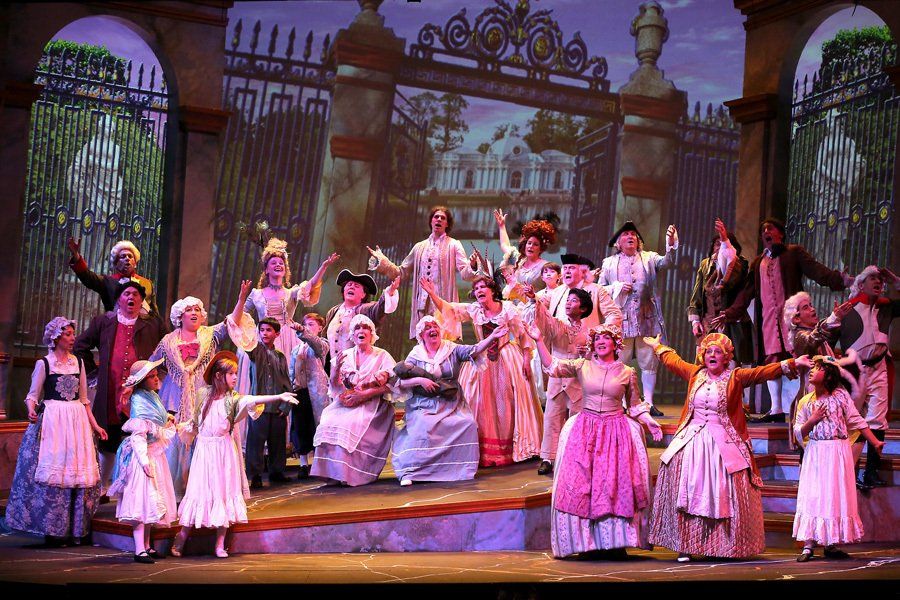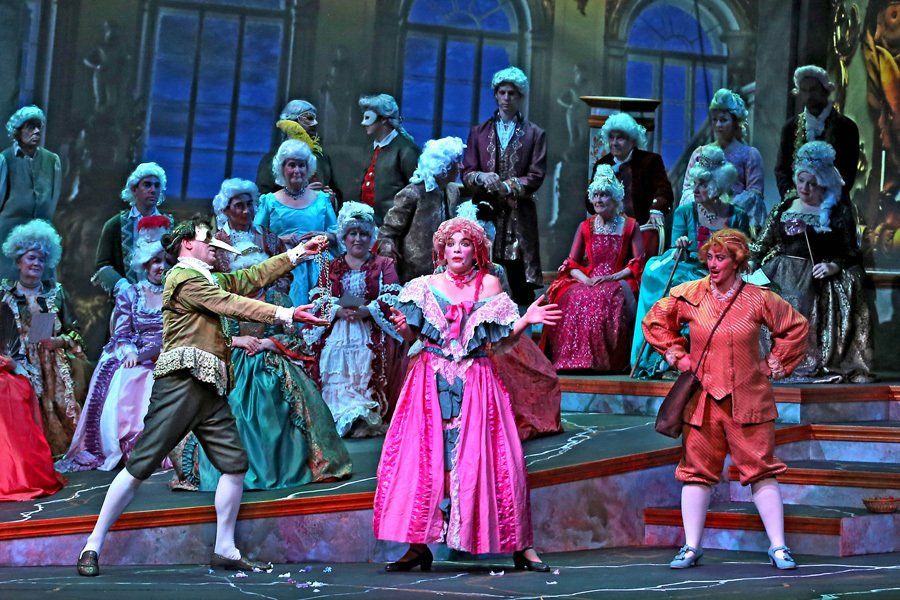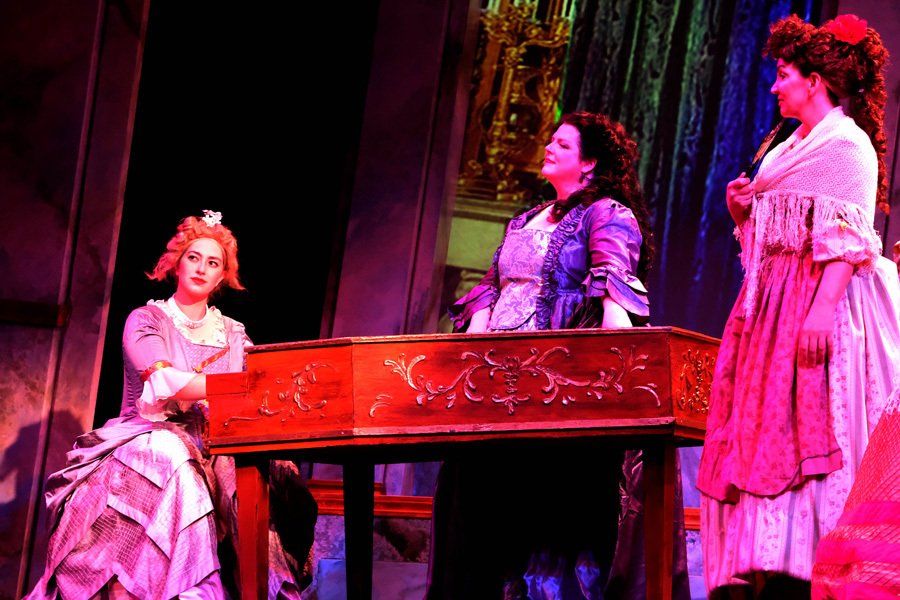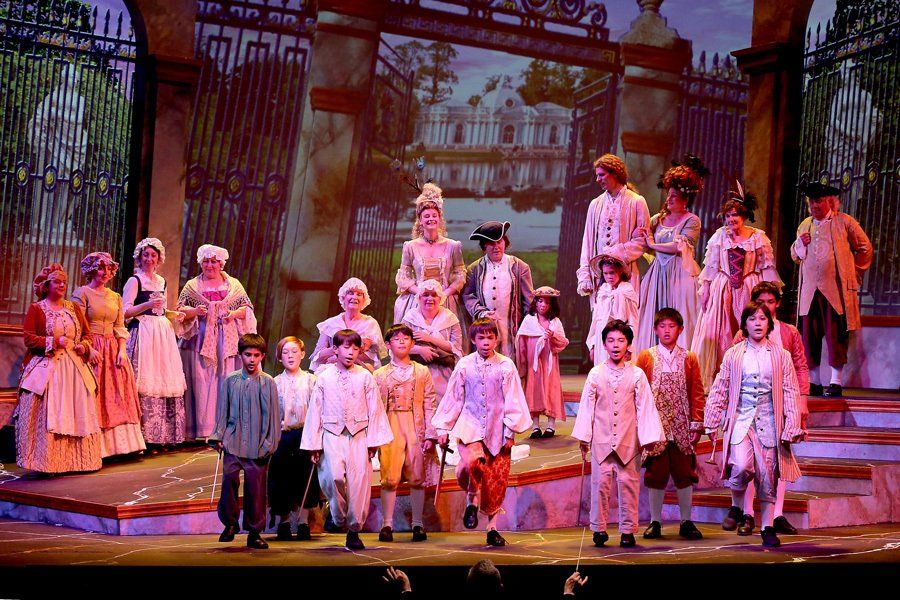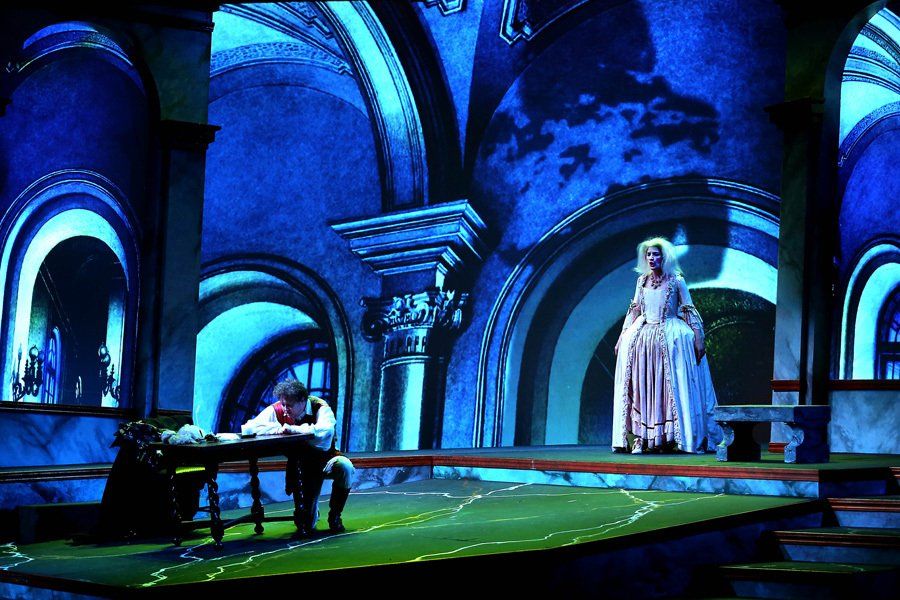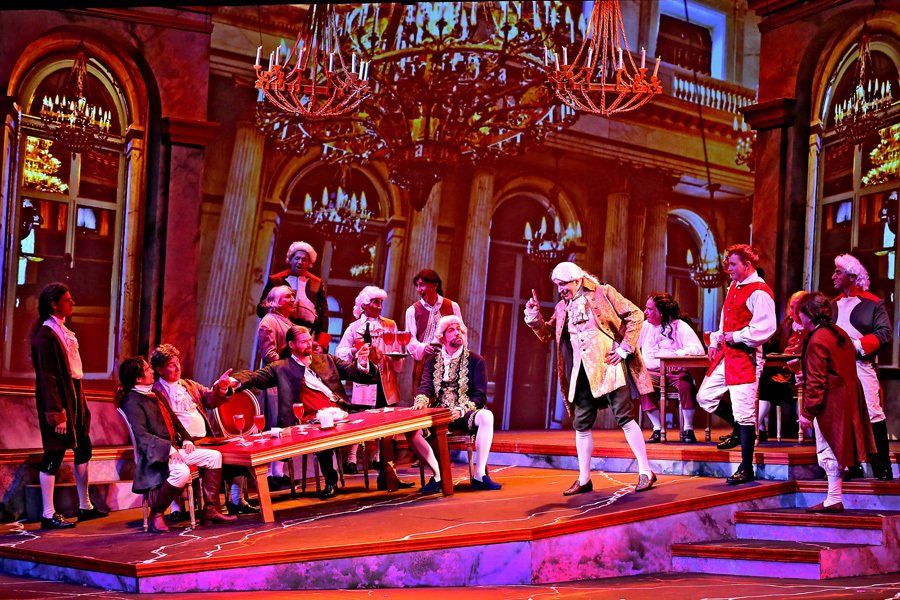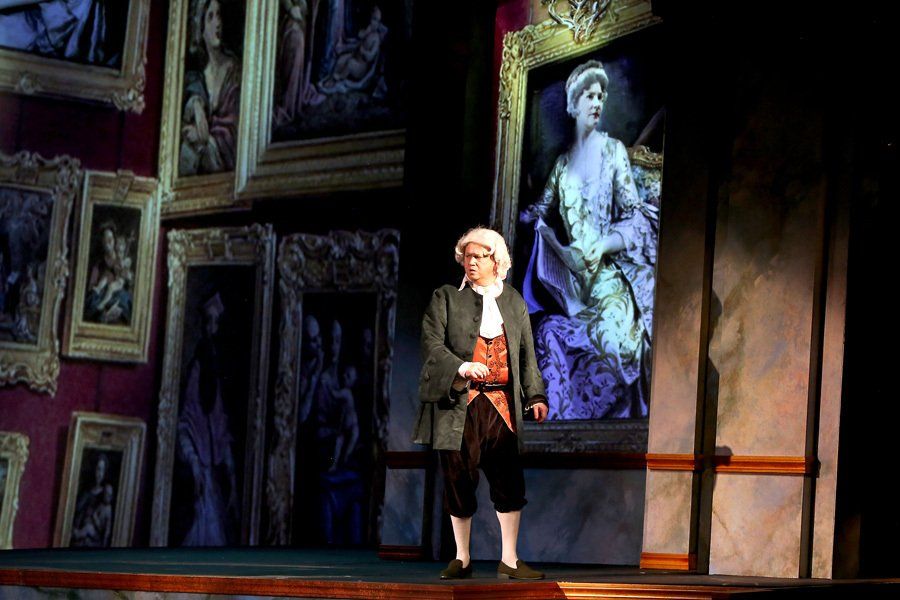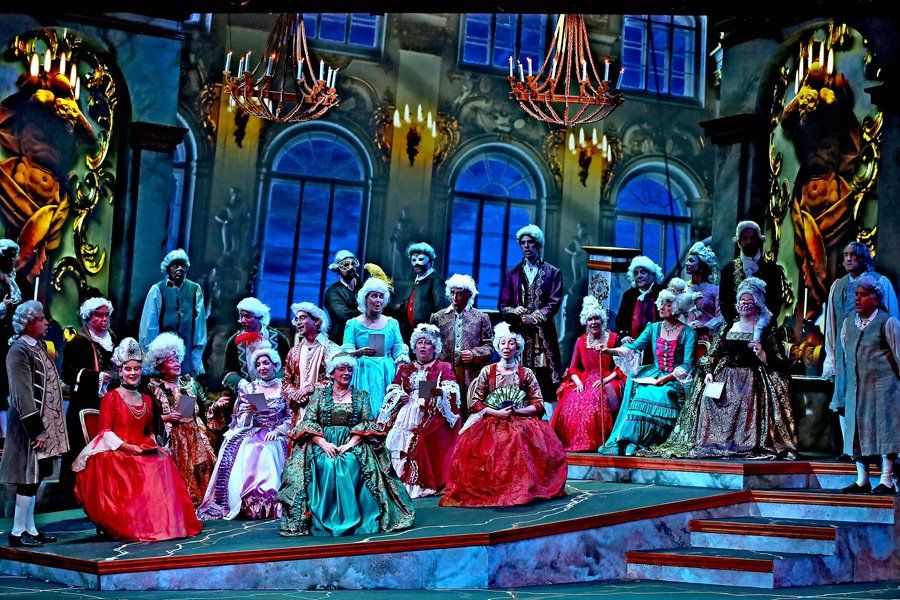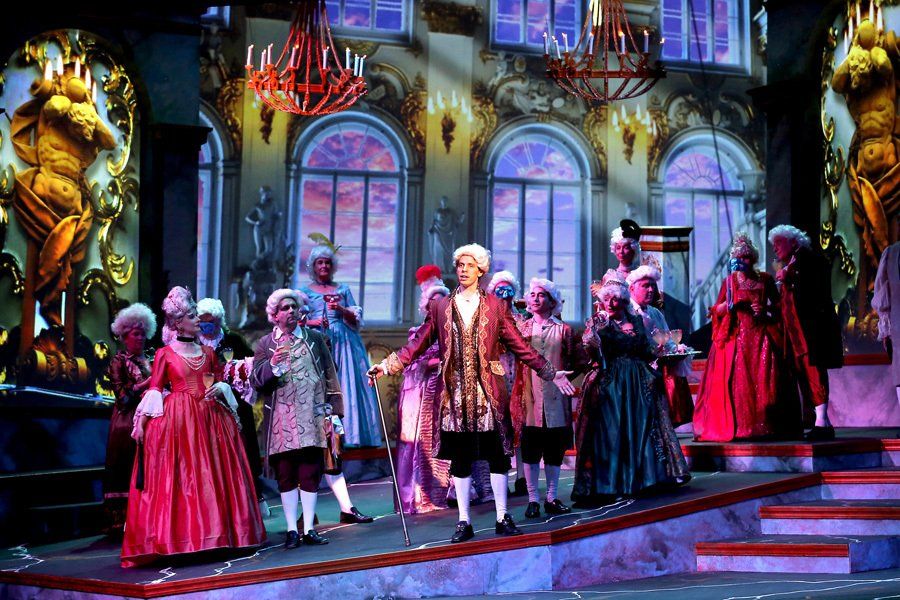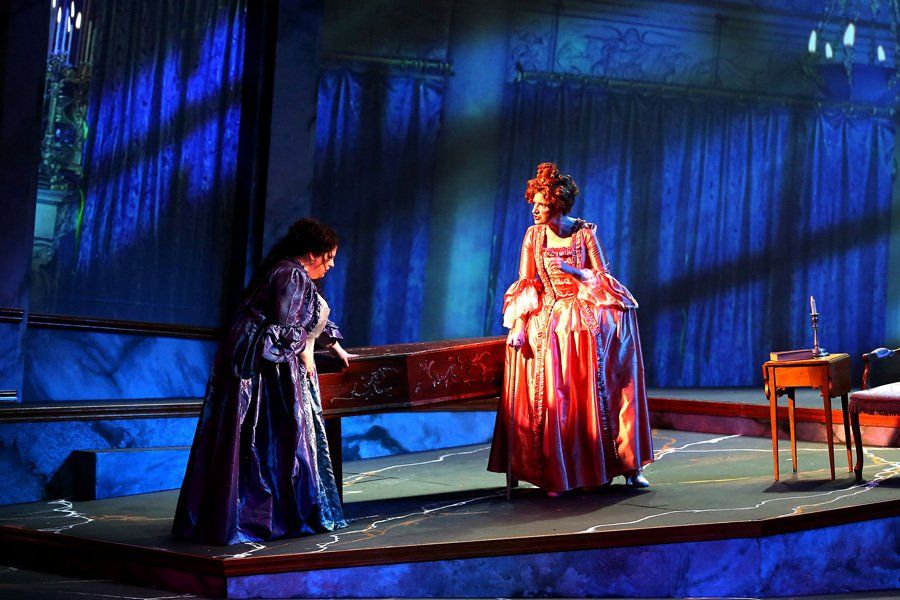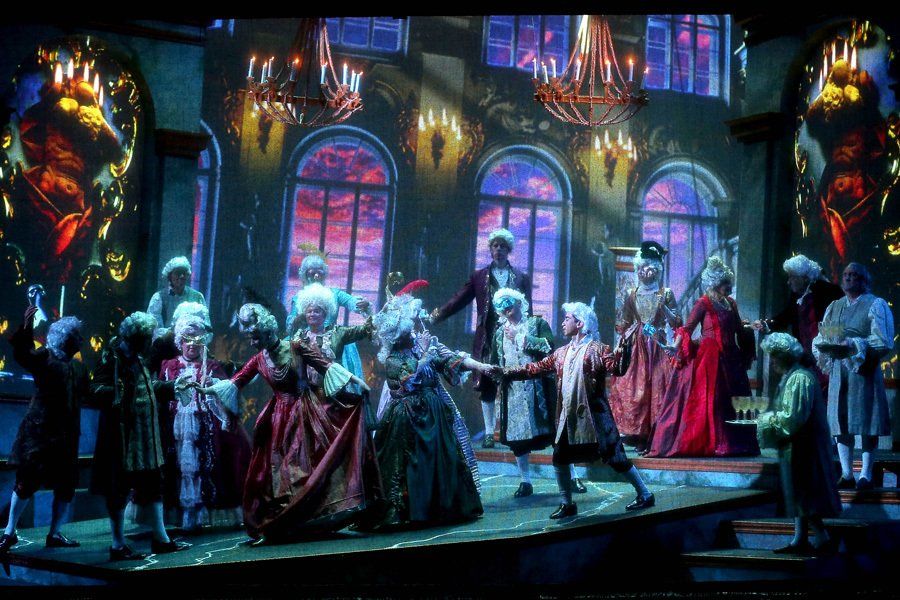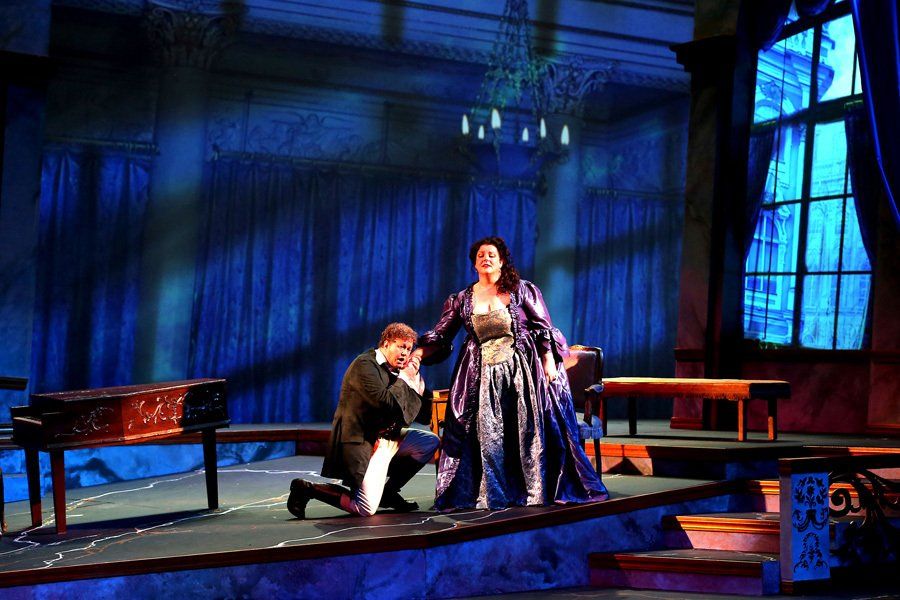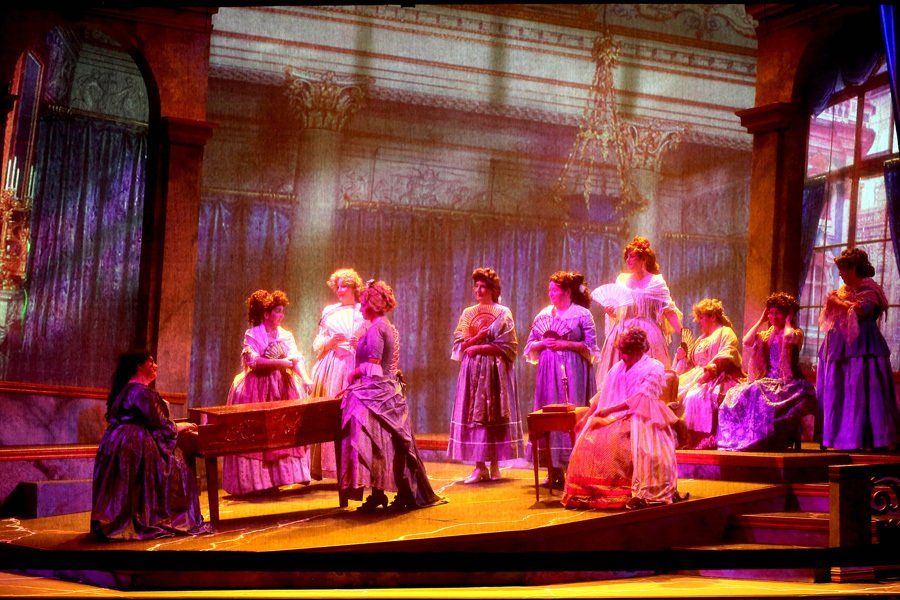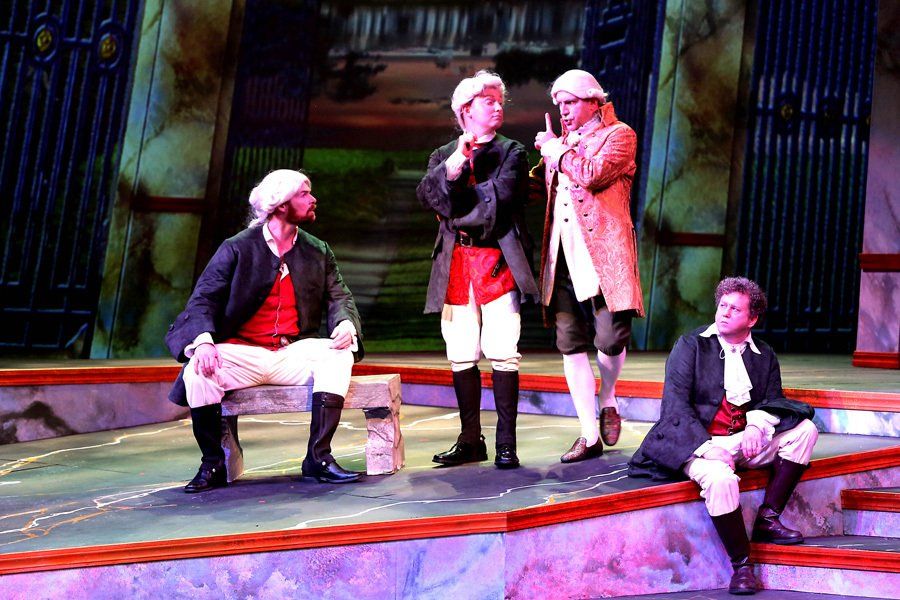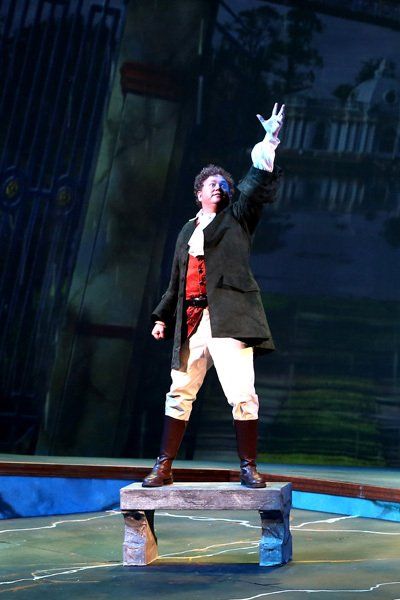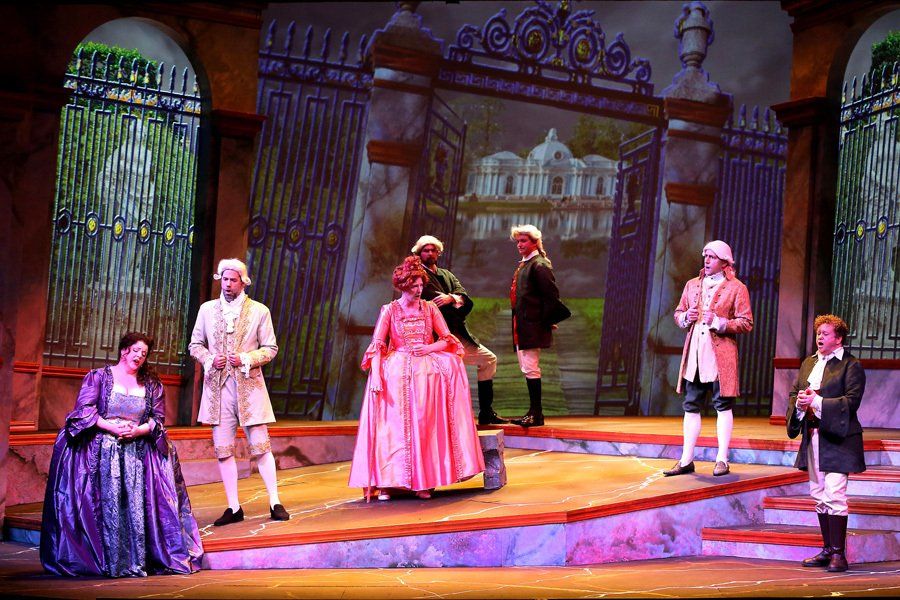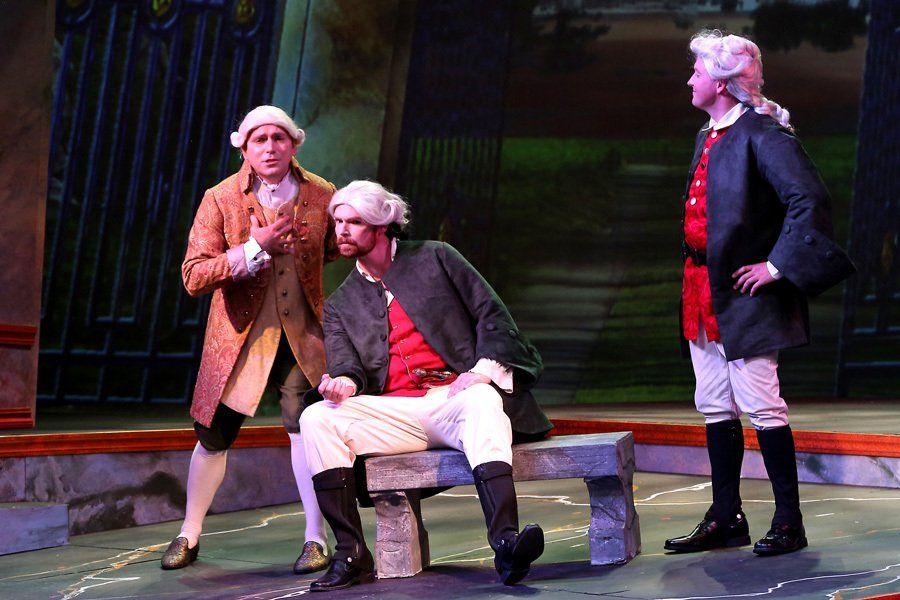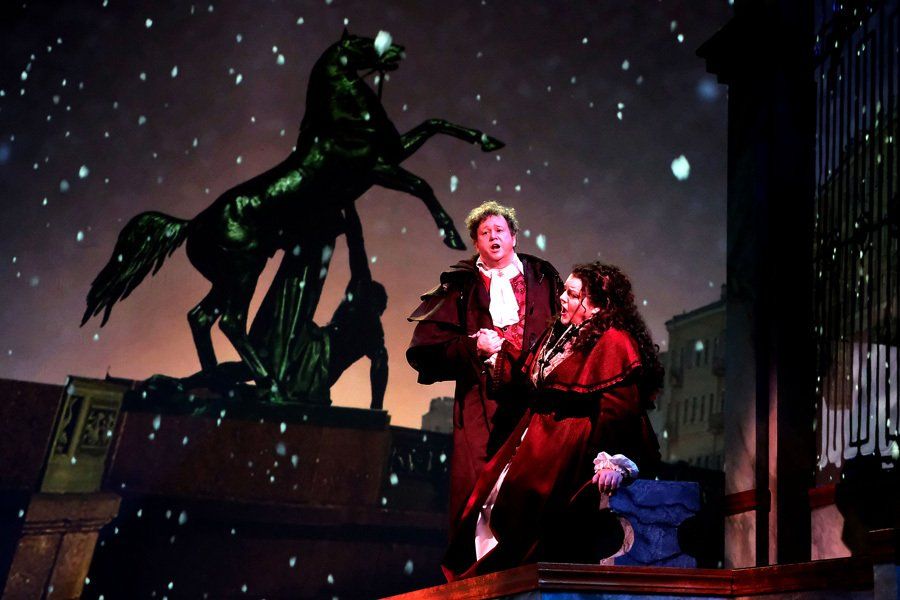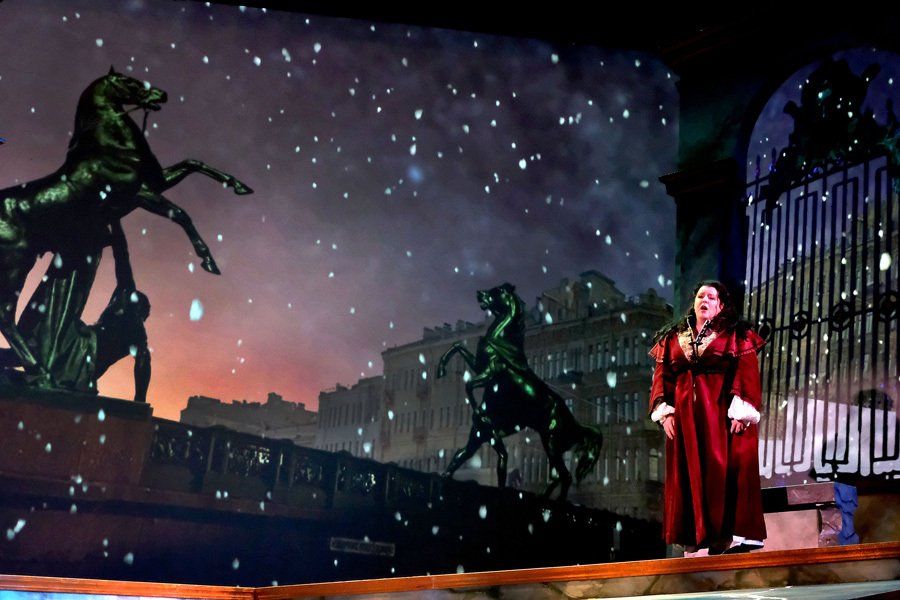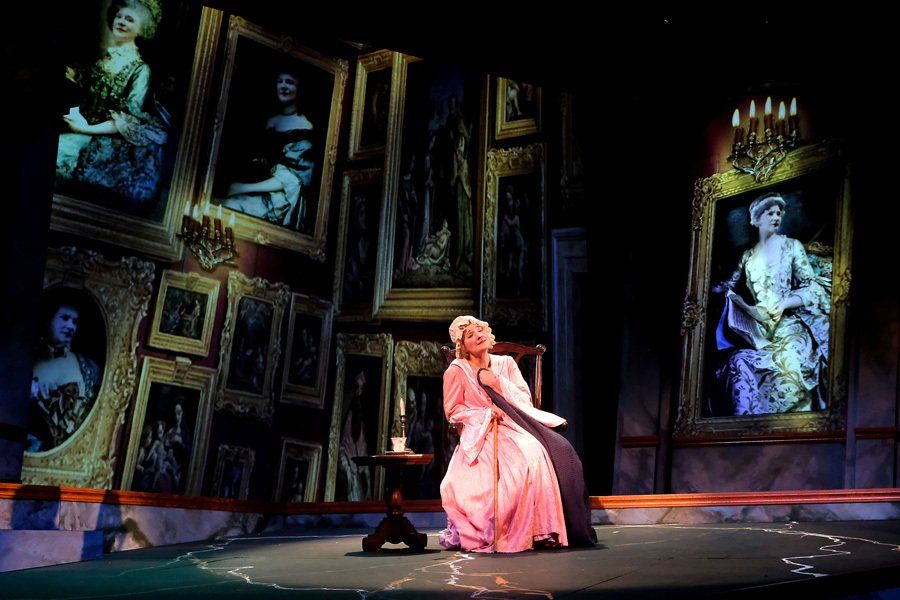Pique Dame
May 21, 2022 by Eddie Reynolds
Pique Dame (The Queen of Spades)
Pyotr Ilyich Tchaikovsky
West Bay Opera
Woodwinds and strings sing in gentle, back-and-forth conversation before other instruments begin to join, building into rolling climaxes of commanding brass and timpani and all leading to a sense of foreboding as projected on the walls before us are splashed, red blotches mingled in a flurried mix of numbers and symbols. Eventually queens appear from their deck of cards to dance about the stage in projected frenzy as the music once again shifts in nature. Black shadows and smoky clouds finally escort the Queen of Spades to rule in her projected state with the orchestra’s outstanding overture leaving us with a final sense of foreboding and unease.
Under the fine direction of José Luis Moscovich, the twenty-seven-piece orchestra thus majestically opens the sixty-sixth season after a two-year, COVID-induced hiatus of Palo Alto’s West Bay Opera with Pyotr Ilyich Tchaikovsky’s Pique Dame (The Queen of Spades). The three-act, two-intermission evening is one where the majority of the fifteen principals’ voices ring forth impressively rich and authentic with performances believable in their emotions and motives – unfortunately with one major exception of the night’s lead role.
Written in 1890 and an audience favorite since its premiere to the present day, this West Bay production of Pique Dame is set in St. Petersburg a century earlier as the tragic tale unfolds of a soldier who falls in love with a Prince’s intended but finds the lure of a sure-fire gambling gain in the end to overrule his reciprocating the adoration this same woman in fact has also for him. Even though the soldier Hermann becomes a crazed brute with more lust for money than for his Liza, opera audiences through the ages often find they have a liking for this devil while also still awarding great sympathy to the ruined Liza.
From the moment we meet Liza singing at her piano with her gathered friends, it is clear Rhoslyn Jones will be the star of the evening. Her soprano time and again will glide with ease and beauty through the wide range of emotions Liza will find herself. After only a silent, across-the-room exchange of glances with the stranger, Hermann, Liza sings soon afterward of her misery and sorrow of a fate to be loved by a worthy prince but to find herself suddenly in burning attraction with this other man of mystery. Singing in moving melancholy, Liza laments in tones round and luxurious, “My girlhood dreams, you have forsaken me” while in a marked shift of tone, she then admits to herself about the stranger, “My soul is in his power.”
As the story progresses and she is able to confide to Hermann her love and to plan for an eventual, secret rendezvous with him, Rhoslyn Jones only gels stronger and stronger in her role as Liza. First singing of a love she believes is fully reciprocated, Liza eventually finds herself in a wretchedly painful Scene Two of Act Two where she sings of the exhaustion with a life that is sorely disappointing her because of a lover that has not lived up to his promises. With a voice that cries with sad brilliance and visceral hurt, Liza intones, “I am weary and worn.” After having a brief moment of reprieve when she believes Hermann’s love may in fact be true, her final despair and self-inflicted death are astonishing both to hear and to watch as singer and actor combine for a memorable finale of her character.
Hermann begins the evening in fine enough form, singing in a tenor quite clear and convincing as he trembles with wonder mixed with a bit of fear for the love he has of a woman whose name he does not know. However, when Michael Boley’s Hermann meets his Liza and sings with her their first duet, the mismatch of vocal power and prowess between the two performers becomes obvious. As his character loses his sense of love in comparison for his drive to uncover a secret three cards that can lead him to gambling fortune, his Hermann falls short time and again to match the emotion of the scene in both his sung vocals and in his performed demeanor. Whether matched in duets with the spurned Prince, with the doomed Countess (who holds the secret of the magical sequence of cards), or with the adoring Liza, this Hermann disappointedly underperforms in needed volume, intensity, and clarity of purpose in comparison to the stronger partner of each particular scene. Only in Hermann’s final moments of life does Michael Boley seem to regain the Hermann we first saw in Act One in terms of a more sterling stage presence, vocally and acting-wise.
Fortunately, however, surrounding both Hermann and Liza are other performers who do measure up in wonderful ways to the requirements of their persona. Kiril Havezov performs in rich baritone the role of Count Tomsky, singing with an air of suspenseful gossip and rolling through waves of paused and quickened phrases as he recounts the story of a young woman obsessed with gambling who once sacrificed her body to learn of a French Count’s secret, three-card sequence that ensured gambling success. That sense of having fun performing in front of his fellow revelers is seen again in the night’s final scene as Tomsky entertains with drunken flair but also in full-sounded, rich excellence, “If pretty girls could fly like birds.”
The young woman in his story is now the aged, cane-supported Countess, grandmother to Liza, played with a dignified, proud sense of her level of aristocracy and elderliness by Laure de Marcellus. As surrounding maids attempt to lure her into bed in Scene Two, Act Two, the Countess sings of earlier loves with a mezzo-soprano voice that increasingly sounds as if locked in a dreamlike trance, finally singing herself to sleep in a lullaby manner. Along the way, her Countess displays the kind of wide-eyed, dramatically posed expressions that one might have once seen on the screens of a silent movie. (Kudos goes both to her and Stage Director, Ragnar Conde.) When she is awakened by an intruding Hermann, Laure de Marcellus is particularly stunning in the gripping scene of the Countess’ demise, with her last breaths sung with memorable, haunting eeriness.
Making fine impressions along the way is also mezzo-soprano Maria Kaganskaya whose Polina (friend of Liza) sings a sad ballad that features her clear, wonderfully deep tones followed by a merrier dance that offers wonderful contrast of style. Later, Maria Kaganskaya returns with Sarah Benzinger to draw one of the night’s biggest rounds of applause as they play Shepherd Milovzor and Shepherdess Prilepa, respectively, singing in robust melodies a playlet that – with the able help of Kiril Havezov (also Count Tomsky) – reflects the storyline of the greater opera in terms of a young girl turning away sure riches for the love of a more common man.
Truly one of the other finest performances of the evening comes from Jonathan Beyer in the role of Prince Yeletsky. His baritone soars as he pleads the case of his love to Liza in Scene 1, Act 2. His raptured entreaties for her to trust his love – even as he can see her heart has turned toward another – are impressively sincere and believable.
Briefer appearances by Jackson Beaman as Chekalinsky, Matthew Lovell as Surin, Alexander Frank as Master of Ceremonies, and Anna Yelizarova as Governess each bring strong, resounding intonations, each worthy of their own kudos.
Kudos also especially goes to the evening’s production team. Once again as she so often does on Bay Area stages, Abra Berman has outdone herself as costume designer, with the entire cast appearing as a live, museum display of late 18thCentury, lower- and upper-class, Russian attire. The projections co-designed by Peter Crompton and Fréderic O. Boulay are a show unto themselves, bringing us into the high-ceiling interiors of estates and cathedrals, the outside of stately gardens and plazas, vast walls full of paintings and niches of statuary, and finally the horrors of ghosts and nightmares. The lighting designed by Steve Mannshardt and the sound design of Giselle Lee sprinkle the tilted-stage, vast windowed scenic design of Peter Crompton with perfectly timed, additional elements to bring celebration, mystery, and suspense onto the stage at just the right moments.
Both the opera’s twenty-one person Chorus (Bruce Olstad, Chorus Master) and the evening’s opening, ten-boy, soldier chorus (Julia Simon, Chorus Master) unfortunately fight a mostly losing battle with an orchestra that too often over-powers their songs, with lyrics usually lost and even harmonies sometimes too indiscernible. A further issue with the main Chorus comes from the stage direction of Ragnar Conde, with the repeated use of frozen stances (including raised arms shifting from one direction to another) just not working. There were also times when the movement on the stage of the Chorus (at least on opening night) was awkward and almost clumsy in appearance.
But given so many strong major and minor character performances as well as the exceptionally strong talents of the production’s creative team, even with a couple of noteworthy misses West Bay Opera’s Pique Dame is well worth seeing, particularly since this popular, Tchaikovsky opera has not been performed by the company since 2007 nor by the larger San Francisco Opera since 2005.
Rating: 3.5 E
Pique Dame (The Queen of Spades) continues in performance May 22, 28, and 29 by the West Bay Opera at Lucie Stern Theatre, 1305 Middlefield Road, Palo Alto. Tickets are available online at https://www.wbopera.org .
https://theatreeddys.com/2022/05/pique-dame.html?utm_source=rss&utm_medium=rss&utm_campaign=pique-dame
